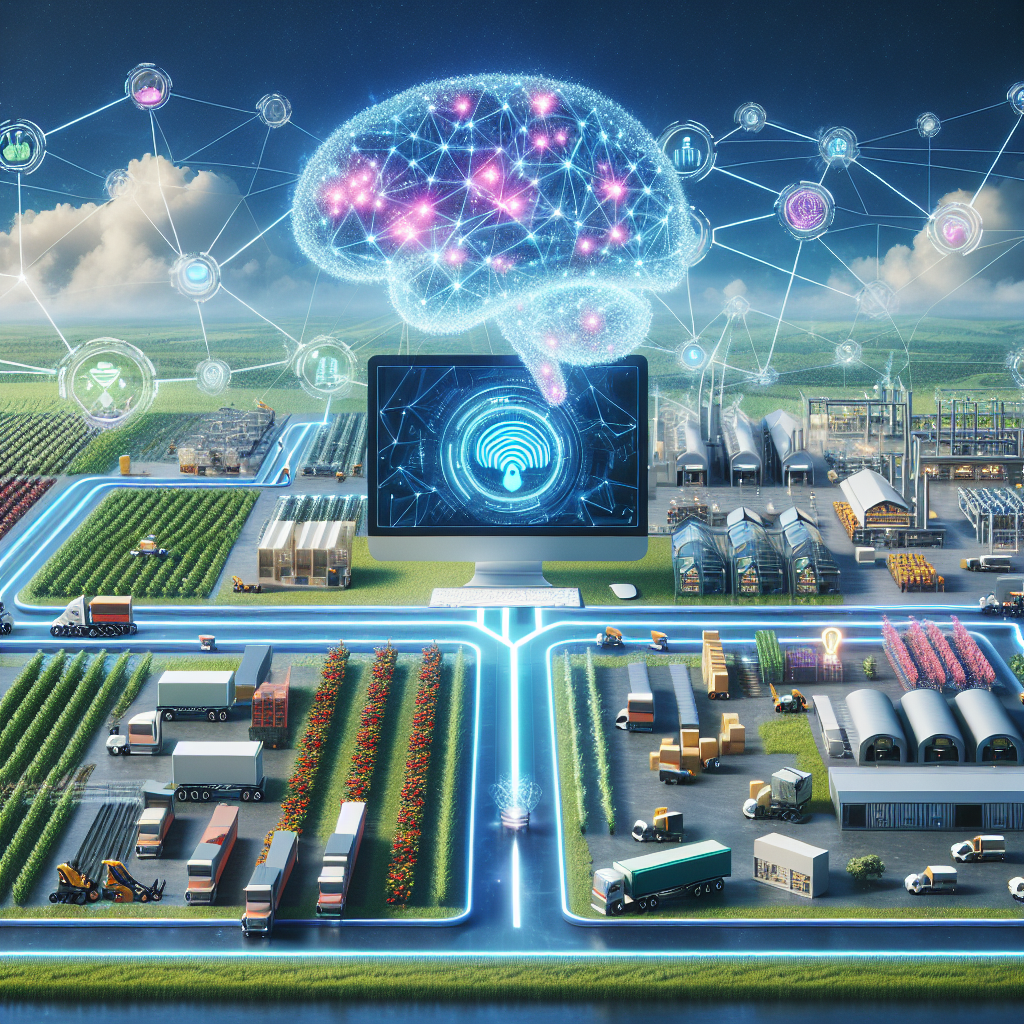The global food supply chain is a complex network of producers, distributors, retailers, and consumers that spans the globe. Ensuring the safety and quality of food products as they move through this supply chain is critical to protecting public health and building consumer trust. One of the key challenges in the food supply chain is traceability, or the ability to track and trace the movement of food products from farm to fork. Traditionally, traceability has been a manual and labor-intensive process, but with the advent of artificial intelligence (AI) technologies, new solutions are emerging that promise to revolutionize food supply chain traceability.
AI-powered solutions for food supply chain traceability leverage advanced technologies such as machine learning, computer vision, and blockchain to automate and streamline the tracking and tracing of food products. These technologies enable real-time monitoring of food products as they move through the supply chain, providing greater visibility and transparency to all stakeholders involved. By harnessing the power of AI, food companies can improve food safety, reduce waste, and enhance consumer confidence in the products they purchase.
One of the key benefits of AI-powered solutions for food supply chain traceability is their ability to detect and respond to issues in real-time. For example, AI algorithms can analyze data from sensors and IoT devices to identify potential food safety risks, such as temperature fluctuations or contamination events. This early warning system allows food companies to take immediate action to prevent the spread of foodborne illnesses and protect consumers from harm.
Another advantage of AI-powered traceability solutions is their ability to track the provenance of food products throughout the supply chain. By recording each step in the journey of a food product on a blockchain ledger, companies can verify the authenticity and quality of their products, ensuring that they meet regulatory requirements and consumer expectations. This level of transparency helps to build trust with consumers and can differentiate products in a crowded marketplace.
In addition to improving food safety and quality, AI-powered traceability solutions can also help food companies optimize their supply chain operations. By analyzing data on product movement, inventory levels, and consumer demand, AI algorithms can identify inefficiencies and opportunities for improvement, leading to cost savings and increased profitability. For example, by using predictive analytics, companies can better anticipate demand for seasonal products and adjust their production schedules accordingly, reducing waste and maximizing sales.
Despite the many benefits of AI-powered solutions for food supply chain traceability, there are also challenges and concerns that must be addressed. One of the key challenges is the cost of implementing these technologies, which can be prohibitive for smaller companies with limited resources. Additionally, there are concerns about data privacy and security, as the use of AI requires the collection and analysis of large amounts of sensitive information. Companies must ensure that they have robust data protection measures in place to safeguard against potential breaches and misuse of data.
To help address these challenges and accelerate the adoption of AI-powered solutions for food supply chain traceability, industry stakeholders are working together to develop standards and best practices. Organizations such as the Food Safety Consortium and the Global Food Traceability Center are leading efforts to establish guidelines for the use of AI in traceability, promote collaboration among stakeholders, and educate the industry on the benefits of these technologies.
In conclusion, AI-powered solutions for food supply chain traceability have the potential to transform the way food products are tracked and traced throughout the supply chain. By leveraging advanced technologies such as machine learning and blockchain, companies can improve food safety, quality, and transparency, while also optimizing their operations and reducing costs. While there are challenges and concerns that must be addressed, the benefits of AI-powered traceability solutions are clear, and the industry is poised to reap the rewards of these innovative technologies in the years to come.
FAQs
Q: What is food supply chain traceability?
A: Food supply chain traceability is the ability to track and trace the movement of food products from their point of origin to the final consumer. This includes recording information on where the food product was produced, processed, and distributed, as well as any changes in ownership or handling along the way.
Q: How does AI improve food supply chain traceability?
A: AI technologies such as machine learning, computer vision, and blockchain can automate and streamline the tracking and tracing of food products, enabling real-time monitoring and analysis of data to detect food safety risks, verify product authenticity, and optimize supply chain operations.
Q: What are the benefits of AI-powered solutions for food supply chain traceability?
A: AI-powered solutions can improve food safety and quality, enhance transparency and trust with consumers, optimize supply chain operations, and reduce costs. By leveraging advanced technologies, companies can better protect public health, comply with regulatory requirements, and gain a competitive edge in the marketplace.
Q: What are the challenges of implementing AI-powered traceability solutions?
A: Challenges include the cost of implementing these technologies, concerns about data privacy and security, and the need for industry standards and best practices. Companies must ensure that they have the resources and infrastructure in place to support the adoption of AI in traceability and address potential risks and vulnerabilities.
Q: How can companies overcome these challenges and adopt AI-powered traceability solutions?
A: Companies can collaborate with industry stakeholders to develop standards and best practices, invest in training and education for employees, and implement robust data protection measures to safeguard against potential breaches and misuse of data. By working together and sharing knowledge, companies can accelerate the adoption of AI in traceability and reap the benefits of these innovative technologies.

